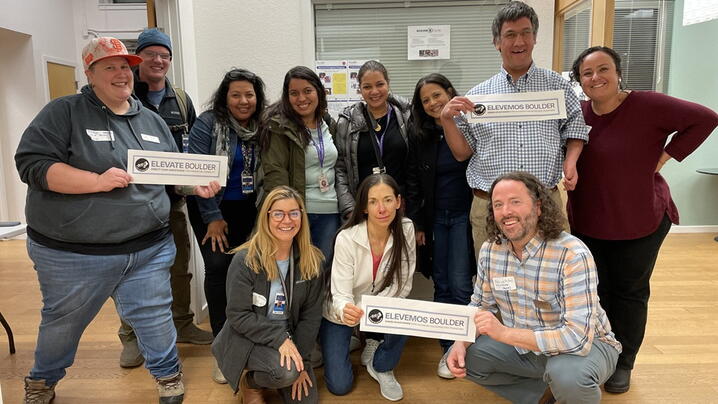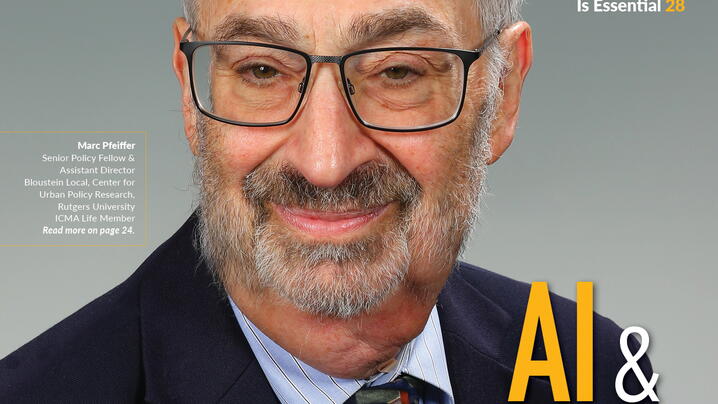- Transcripts
-
Transcripts are generated using a combination of speech recognition software and human transcribers and may contain errors. Please check the corresponding audio before quoting in print.
Joe Supervielle:
On today's episode ICMA President, Troy Brown, joins us to announce a reduced due structure and discuss regional events.
[SPONSORED AD]
Joe Supervielle:
Welcome to Voices and Local Government, an ICMA podcast. My name is Joe Supervielle. With us today is the city manager of Moorpark, California, and president of ICMA, Mr. Troy Brown. Thanks for joining us today, sir.
Troy Brown:
Yeah, thanks Joe. Yeah, I'm the city manager of Moorpark, California. I've been here for four years now. I'm the city's second ever city manager in our approximate 35 year history here, so I think that speaks a lot to the council manager from a government and the commitment to that former government here.
Moorpark is a great city. We have about 37,000 residents. 53 hardworking employees serve those residents. And we provide a myriad of services from parks and recreation, community development, finance and administration. Primarily a contract city. We contract out for police, fire, and a lot of the public works duties are contracted out as well. Our budget is approximately $19 million, which is a lean budget, but certainly enough to be effective.
Joe Supervielle:
All right. Shifting back to ICMA big picture, top concerns, challenges, and also opportunities that city managers will face in 2022 and beyond.
You can give your personal opinion on that. We'd also like to hear maybe what the feedback you're getting from, or the direction you're getting from council or your colleagues or even the public. You can kind of find that to Moorpark or bring it out regionally, and then we'll shift into the ICMA as a whole.
Troy Brown:
Great. I appreciate that, Joe. When I became president in Portland, I talked about the challenges that local government was going to face as we came out of the pandemic. I don't know when that date will be, but there certainly is ...The transition is talking about going from a pandemic to an endemic.
But the pandemic taught us a lot about the services that we provide in our workforce. And there was a race to adjust to the new social distancing norms that came out in place. And as I mentioned, in Portland, throughout that process a lot of people's left local government as we retooled our service model. And as we now begin to emerge out of the pandemic, I think one of the challenges that local governments are going to face across the board is attracting and retaining talent. And then transitioning our workforce back into some sort of normalcy.
I can tell you that attracting people into local government was always challenging. I think but now you see a lot of people choosing different reasons for taking a career path that they're taking. And yet, we still have a need to provide vital services to our community. So I do think that providing some sustainable pathways to keep your workforce engaged and full of the talent that it needs to be, is going to be a real challenge going into the future for us, as we emerge from the pandemic. We're going to have to retool how we delivered our services. Not go back to of the way things were before the pandemic. But that challenge is in trying to really make us better, so I think that that's going to be a real challenge.
Another challenge that I think managers are facing today, particularly in this day and age, is related to the supply chain and costs. A lot of what we do is related to constructing the built environment, and the prices for that and the supplies to do that are just skyrocketing across the globe. And it's really going to have a challenge on how we finance projects and how we get these projects in the ground into the future. We're going to need to be creative in terms of identifying funding sources, identifying priorities for which projects get in the ground on a timely basis.
And then finally, I think that this is an ongoing challenge that local government has faced for years. And certainly a need that we're going to have moving forward, is how to engage the community throughout that process. The proliferation of social media and other medias has really changed the way that we get input from people. And rather than getting just feedback all the time, which is what social media's great for, we need to develop ways to get meaningful input in the face of people really not wanting to engage and sit in a crowded room and talk about things anymore. That's really going to challenge us to find creative ways to who continue to engage with the community moving forward.
And those issues are not unique to Moorpark. I think that those issues are a challenge for local governments around the world. And I'm proud to be a part of ICMA, who's actually working on the front lines to develop toolkits and methodologies to address some of these challenges. Lots of challenges moving forward, but I'm confident in looking around at the cadre of folks that are serving this profession, that we're going to move these issues forward.
Joe Supervielle:
Yeah, that's what we're here for, resources and shared knowledge amongst the members. It sounds like budget is one of the key themes throughout all those items you just mentioned, and there's not necessarily early and easy answer there. But whether it's efficiency to save money or revenue sources on the front end, that's going to have to be addressed one way or another.
Are those the kind of conversations you're still having with council and staff? And where does that sit as you all have reevaluated for this calendar year at least?
Troy Brown:
Those are not easy conversations. And beyond the conversation about balancing the priorities and dealing with the budget side of it, some of the things that we're doing is we're looking at, are there strategic partners along with us that we can leverage our resources together to try and stretch our dollars to make them go further.
As we're looking at either road connectivity or even trail connectivity, we're reaching out and having conversations with a lot of our strategic partners in the land conservation area or in the parks, in open space district area, that can help us partner together. And I think it will make the competitive world of grants even more competitive.
But by and large, a lot of that's going to come down to timing. A lot of that's going to come down to available resources. But a lot of it can be also resolved through design. We may need to look at how we're designing projects and get those things that are really important to achieve done in the forefront, and then come back and phase in projects later.
There's no magic bullet for it, as you talked about, but it certainly is forcing conversations as we enter into budget processes about what's important in our community. What are those things that we can do really, really well and focus our energies there, rather than trying to do a lot of little things and really not making significant progress in a way that's meaningful and impactful that we're trying to do.
Joe Supervielle:
Well, speaking of money, as we shift to how ICMA can fit in and your role as president right now, some good news I think for members out there are the reevaluated due structure. So I'll just hand it off to you without even really a question here, but let you update anyone who hasn't yet been part of it or heard the update there on dues.
Troy Brown:
Yeah. Thank you, Joe. I appreciate that. The dues structure of ICMA has been a long standing issue within the association, and there's a lot to unpack there. But it gets back to the value proposition of the association. And you want to feel like that you're paying dues at a meaningful level for the value that you're getting out of the association.
And this has been an ongoing conflict within the association over a number of years. When I was first joining ICMA, I, myself, used to question. This due structure, here I am early or mid-career, and is this really where I want to put all my eggs in the basket? And I'll tell you, the ICMA board has had conversations around the due structure for over 10 years. Back in 2005, they were talking about the due structure.
But as we've progressed through that conversation, we've established some values for the association. And one of the things that the association values is providing access to early career professionals, mid-career professional, as well as those well tenured people that have been part of the profession and the association for many years. So if that's one of our values, then we have to make sure that our due structure reflects that and provides pathways from everyone from students, to department heads, to long tenured city managers, ways to come into the organization.
At the last ICMA board meeting, which we recently had in February of this year, the board received the presentation from the finance committee who's been working on this issue with a consultant over the past year. And the results of that show that we can make significant changes to not only the due structure and what people will be paying for it, but we can also lower the cap for those members that have reached the cap of the structure of the due structure, and provide some savings there.
It does have some financial impacts to it, but we believe that through the ability to allow additional pathways for members to join the association, that by bringing in more members over time, the revenues from the dues will mitigate the impacts of reducing the fees. ICMA has never, since its incorporation, proposed reducing its fee structure.
And so I'm proud of the board, I'm proud of the finance committee. And I'm proud of everyone that took a bold look at this and came up with some really monumental changes that are going to shift the way people access this organization, and the value that they get out of the dollars that they provide to join this association. Really proud of that.
Joe Supervielle:
That. And more details to come in the coming weeks, leading into some of these regional events for the members out there.
Troy Brown:
There will be a full rollout, explaining all the details of what the new structure is about. But suffice it to say, it's definitely a watershed moment for the association.
Joe Supervielle:
Yeah. And good news for existing members, but you said it too, I think a good opportunity for people who have considered it in the past or who aren't maybe even necessarily aware, but they can see the cost and see the value proposition and get more excited about joining.
The next topic in terms of ICMA vision is the diversity, equity and inclusion, DEI as we call it. Not always an easy topic to talk about, but that's the cliche, "Oh, we need to talk about it, we need to about it." So here we are. We're going to talk about it, the good, bad, and the ugly side of it.
Again, not even necessarily leading off with a specific question, but if you want to jump in and just give the overview of the back and forth there's been recently. What the board discussed, what they've decided on for ICMA moving forward in this topic.
Troy Brown:
Yeah, Joe, so thank you for that. And that is a difficult conversation, but it's certainly a conversation that's worth having. Words matter here, so I want to make sure that we're describing things at least in a light that we're both coming at it from the same perspective.
As it relates to diversity, equity and inclusion, ICMA has had a long-standing history of making progress in this area. And what I've heard is there's really no disagreement in terms of the efforts that the association is putting forth as it relates to diversity, equity and inclusiveness. Particularly for the association, for our governance structure, and in our communities.
However, what has fallen from that is the issue of social justice. And the issue of social justice is controversial and is at least divisive among some of the memberships. Now for me, the issue of social justice has been around for many decades within ICMA. In fact, if we go back to the early 1970s, when Sy Murray, who was the former city manager of Cincinnati, Ohio, and the first African American president of ICMA. At that time against the backdrop of social upheaval and change, ICMA established a taskforce on race relations that described a series of actions that the association could consider for 1970 and beyond.
And that decade that was ending had ushered in a whole new era of policies and programs, social movements and campaigns, that begins the process that we continue on today, of breaking down and eroding the [inaudible 00:13:26] of social injustice. Like other institutions, ICMA was evolving at that time of social changes. And following the death of George Floyd, ICMA issued a statement, and the executive director issued a statement, condemning that action. And we continued on a lot of our efforts as it related to social justice.
There are members within the association that feel like ICMA weighing into the social justice arena, that's political and it represents ... This is characterizations of what I've heard, not necessarily my beliefs, but it represents characterizations and implementation of what the left is doing. I don't agree with that, I agree that ... I believe that social justice and a look at providing access to governmental services is something that is the responsibility of all public administrators, but I don't discount what it is that I'm hearing.
In order to really wrap, at least my mind and the board's mind around this, one of the things that we're going to be doing, is at each of the regional summits I will be facilitating a conversation to hear from the broader membership in terms of what are their perspectives on ICMAs efforts in social justice inequity. Is there things that we should be doing more of? Are there things that we should be doing less of? What are their concerns with that? What are their beliefs on that? What are benefits of that?
We're by no means complete with that conversation. I'm looking forward to hearing from the members throughout that conversation, so we can develop the programs and services that the memberships need to serve their communities on a daily basis. So yes, that issue is out there, it is an ongoing conversation. And I'm actually looking forward to participating in that conversation and learning those perspectives. I want to hear both sides of what's going on so that we can take that information back into the policy development realm with the board, and develop programs and services consistent with what the members are hearing.
Joe Supervielle:
To clear up any potential confusion, it's not a matter of any group of people or individuals positioning themselves as against social justice or diversity and equity. It's more of the, how does ICMA fit in and what's appropriate or not. It's not a yes or no, but it's about what ICMA should be doing moving forward, not a matter of if those things are right or just or worthwhile.
Troy Brown:
No. That's exactly right, Joe. I mean, we have a responsibility to provide services to everyone in our community and everyone within our associations and pathways for self-actualization people. And whether you couch that in social terms or whether you couch that in political terms, this is not about one person or one group of people. I think it's about everyone's understanding at least from the same perspective of where we're trying to get to, where we're going, and why we're in that space or not.
And just like we clarified in the beginning because the words matter, I don't believe that it's about diversity, equity and inclusion. I do believe it's more about the social justice efforts that ICMA is putting forward. And sometimes even those terms can get interwoven and interplayed. So it's really important that we're coming at this from at least a level playing field so that we can have those difficult conversations around this.
And I'll tell you, this is not the first time that ICMA has had difficult conversations around things such as that. We had difficult conversations before and we will continue to.
Joe Supervielle:
And you're on this podcast talking about it, the platform's open to members out there. And at the regional events, you just said it, it's a conversation. It's not just leadership or you or the board talking at the members. It's a chance for them to give their opinions, their concerns, their ideas, to come to the best consensus possible, which we all understand that's not going to ... You can't please everyone all the time, but the conversation will happen.
And that's part of ICMA's goal right now is to ... I don't even want to use the cliche of safe space, but it is intended to be a safe place for people to express their views without necessarily immediately having a finger pointed back at them or any assumptions made on their stance, based on what they're saying or even the type of place they're from.
Troy Brown:
That's right, Joe. At the same time, I don't want to overshadow the benefits of going to the regional summits. I mean, beyond those conversations, which are certainly important to me, there's a lot of benefit to attending a regional conference. Not only from a networking perspective and meeting with your counterparts within the region, but also the educational opportunities that are lined up for these are really outstanding.
And I'm just looking forward to getting back and meeting people in-person. I think that's part of the benefit of the regional conference. And some of the things that we've missed out on as an association as we've navigated through the pandemic, is the opportunity to sit down and actually talk to people. That's a really great forum for that to happen, and I'm looking forward to attending the regional summit.
Joe Supervielle:
Yeah. Well, you just preempted really the last question about the ICMA regionals, what to expect, what you're looking forward to. It's not just one heavy conversation about social justice, there's a lot on the agendas. The websites for the individual regions will be linked on this podcast and you can find it on the icma.org homepage.
And we're just encouraging as many people to get back in-person to meet their colleagues, network, talk about all these topics, the priority topics of ICMA. And just even personally in their day-to-day job, what they're going through and bounce ideas off each other, which is again why we're here in the first place.
Troy Brown:
That's right. That's right.
Joe Supervielle:
Well, Mr. Brown, thanks for your time today. I appreciate the insight. Good of news on the due structure. Again, more details to come on that.
Troy Brown:
Thank you.
Joe Supervielle:
And of course happy to have you back any time to give updates for the membership. We'll get feedback from others and maybe address some questions that you or others can answer directly. Again, this platform is for the members, this podcast, PM Magazine, the blog we're here to discuss what is important to ICMA members, so the more feedback the better.
Troy Brown:
That's great, Joe, thank you very much. I'd love to come back.
Joe Supervielle:
Thanks for your time. Bye.
Guest Information
Troy Brown, ICMA-CM, city manager of Moorpark, CA, and ICMA President | view LinkedIn profile
Episode Notes
Discussed in this episode:
- Changes in the dues structure that makes membership more accessible.
- Priorities, challenges and opportunities city managers and their staff are taking on in 2022.
- How Diversity, Equity, and Inclusion (DEI) is different than Social Justice and why it matters. Plus ICMA’s current position on addressing each and how leadership is open to feedback directly from members.
Resources:





